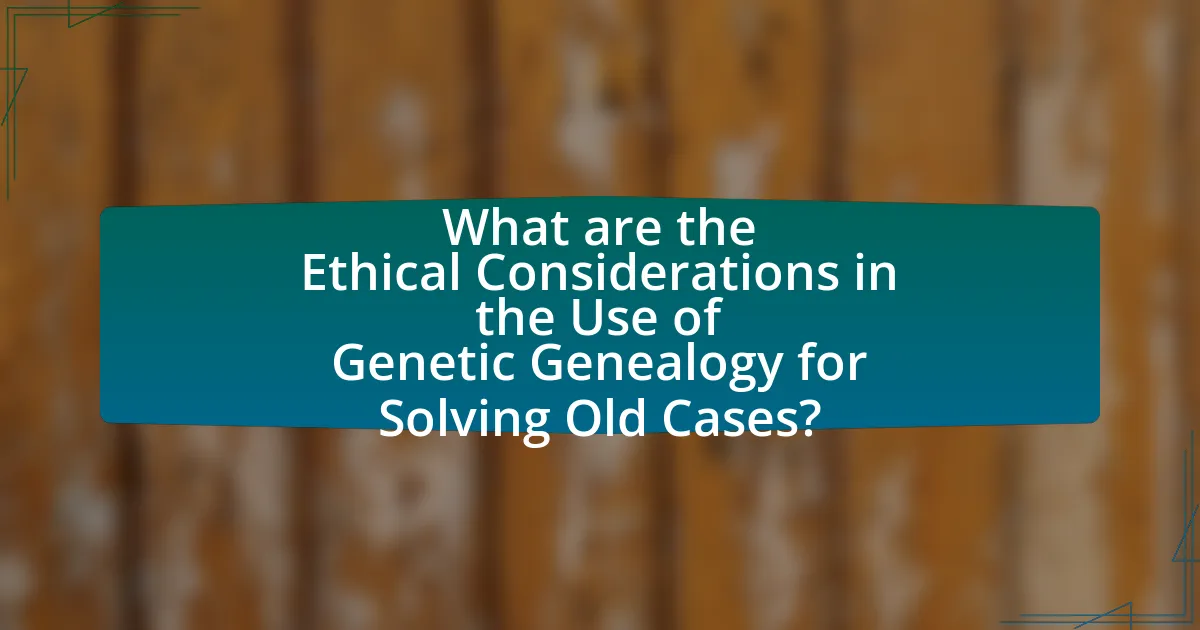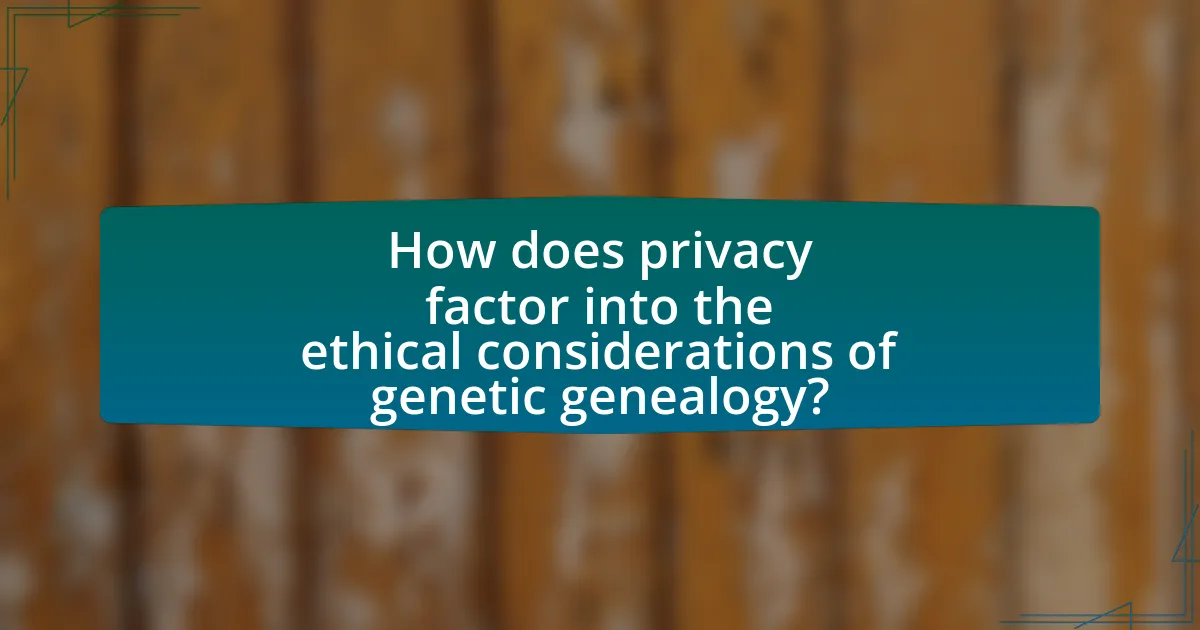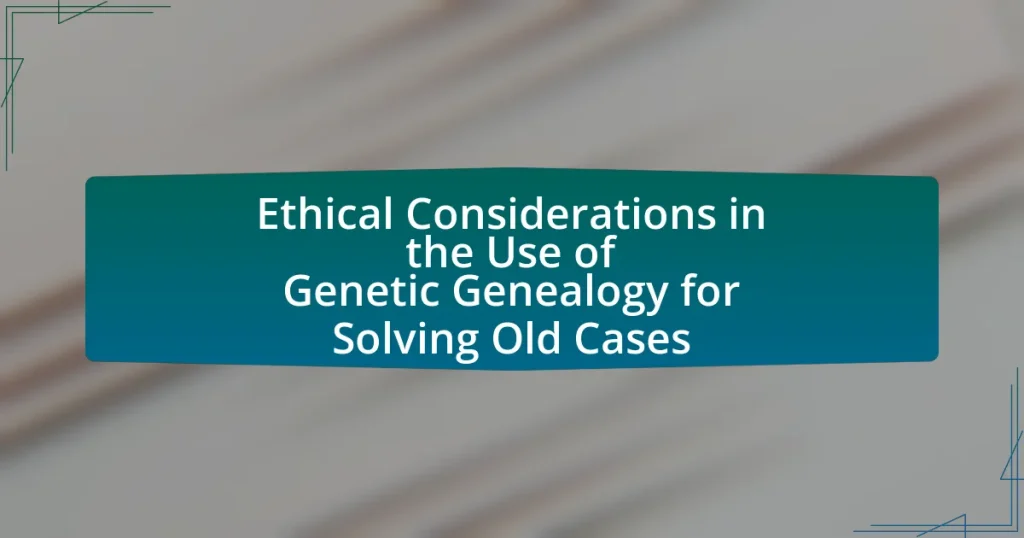The article focuses on the ethical considerations surrounding the use of genetic genealogy in solving old criminal cases. It addresses critical issues such as privacy concerns, consent, and the potential for discrimination, emphasizing the importance of informed consent and robust privacy protections. The discussion highlights how ethical practices can enhance public trust in law enforcement, improve the effectiveness of investigations, and ensure that the benefits of genetic genealogy do not compromise individual rights. Additionally, it explores the implications of ethical breaches and the role of laws and regulations in shaping responsible practices within the field.

What are the Ethical Considerations in the Use of Genetic Genealogy for Solving Old Cases?
The ethical considerations in the use of genetic genealogy for solving old cases include privacy concerns, consent issues, and the potential for discrimination. Privacy concerns arise because genetic data can reveal sensitive information about individuals and their relatives, leading to unauthorized access or misuse of personal information. Consent issues are significant, as individuals may not have explicitly agreed to have their genetic information used for law enforcement purposes, especially if their data was obtained from public databases. Additionally, the potential for discrimination exists, as certain populations may be disproportionately affected by genetic surveillance, leading to biases in investigations and outcomes. These considerations highlight the need for clear ethical guidelines and regulations governing the use of genetic genealogy in criminal justice.
Why is ethical consideration important in genetic genealogy?
Ethical consideration is important in genetic genealogy because it addresses the potential misuse of genetic data and the privacy rights of individuals. Genetic genealogy can reveal sensitive information about ancestry and familial connections, which may not only affect the individuals who submit their DNA but also their relatives. For instance, the unauthorized use of genetic data can lead to breaches of privacy and consent, as highlighted by cases where law enforcement has accessed genetic databases without explicit permission from users. Furthermore, ethical guidelines help ensure that the benefits of genetic genealogy, such as solving cold cases, do not come at the expense of individual rights and societal trust.
What ethical dilemmas arise from using genetic genealogy?
Using genetic genealogy raises several ethical dilemmas, primarily concerning privacy, consent, and potential discrimination. Privacy issues arise when individuals’ genetic data is shared without their explicit consent, leading to unauthorized access to sensitive information about family connections and health risks. Consent becomes problematic when individuals submit their DNA for testing, as they may not fully understand how their data could be used, including implications for relatives who have not consented. Additionally, there is a risk of discrimination based on genetic information, which could affect insurance coverage or employment opportunities. These dilemmas highlight the need for clear ethical guidelines and regulations in the use of genetic genealogy.
How do ethical considerations impact public trust in law enforcement?
Ethical considerations significantly impact public trust in law enforcement by influencing perceptions of legitimacy and accountability. When law enforcement agencies adhere to ethical standards, such as transparency, fairness, and respect for privacy, they foster a sense of trust among community members. For instance, a study by the Pew Research Center found that 66% of Americans believe that police misconduct erodes public trust, highlighting the importance of ethical behavior in maintaining community confidence. Conversely, unethical practices, such as racial profiling or misuse of genetic data, can lead to public skepticism and diminished cooperation with law enforcement efforts. Therefore, ethical considerations are crucial in shaping the relationship between law enforcement and the communities they serve.
What are the potential benefits of ethical practices in genetic genealogy?
Ethical practices in genetic genealogy can enhance trust and collaboration among participants, leading to more accurate and responsible use of genetic data. By ensuring informed consent and protecting privacy, ethical practices foster a respectful environment that encourages individuals to share their genetic information. This, in turn, can facilitate the resolution of cold cases and improve public safety by allowing law enforcement to access valuable genetic insights while maintaining the dignity of individuals involved. Furthermore, adherence to ethical standards can promote public confidence in genetic genealogy as a legitimate tool for solving crimes, ultimately increasing participation and the effectiveness of investigations.
How can ethical practices enhance the effectiveness of investigations?
Ethical practices enhance the effectiveness of investigations by fostering trust and cooperation among stakeholders, which is crucial for gathering accurate information. When investigators adhere to ethical standards, they are more likely to gain the confidence of the community, witnesses, and potential informants, leading to increased willingness to share vital information. For instance, a study published in the Journal of Forensic Sciences highlights that ethical transparency in investigative processes significantly improves public engagement and support, ultimately resulting in more successful case resolutions. By prioritizing ethical considerations, investigators can ensure that their methods are not only effective but also respected and accepted by the communities they serve.
What role does informed consent play in ethical genetic genealogy?
Informed consent is crucial in ethical genetic genealogy as it ensures that individuals understand and agree to the use of their genetic information for research or investigative purposes. This consent process protects personal autonomy and privacy, allowing individuals to make informed decisions about how their genetic data may be utilized. Ethical guidelines, such as those established by the American Society of Human Genetics, emphasize the necessity of obtaining explicit consent to prevent misuse of genetic information and to respect the rights of individuals and their families. Furthermore, informed consent fosters trust between genetic genealogists and participants, which is essential for the responsible use of genetic data in solving old cases.

How does privacy factor into the ethical considerations of genetic genealogy?
Privacy is a critical factor in the ethical considerations of genetic genealogy, as it involves the collection and analysis of individuals’ genetic data, which can reveal sensitive personal information. The use of genetic genealogy can lead to unintended disclosures about familial relationships and health predispositions, raising concerns about consent and the potential for misuse of data. For instance, in cases where law enforcement utilizes genetic databases to solve crimes, individuals who submitted their DNA for personal reasons may not have anticipated that their genetic information could be used in criminal investigations, highlighting the ethical dilemma surrounding informed consent. Furthermore, studies indicate that a significant percentage of individuals are concerned about privacy implications, with a 2019 survey revealing that 60% of respondents expressed worries about how their genetic data might be used beyond the original intent. This underscores the necessity for robust privacy protections and ethical guidelines to ensure that genetic genealogy practices respect individual rights and maintain public trust.
What privacy concerns are associated with genetic data usage?
Genetic data usage raises significant privacy concerns, primarily related to the potential for unauthorized access and misuse of sensitive personal information. Individuals may not fully understand how their genetic data can be used, leading to risks of discrimination by employers or insurers based on genetic predispositions. Additionally, the aggregation of genetic data can inadvertently reveal information about relatives, compromising their privacy without consent. Studies indicate that genetic data can be re-identified even when anonymized, highlighting the inadequacy of current privacy protections. For instance, a 2019 study published in the journal “Nature” demonstrated that 99.9% of individuals could be uniquely identified using just a small amount of genetic data, underscoring the urgent need for robust privacy safeguards in genetic research and genealogy.
How can individuals protect their genetic information?
Individuals can protect their genetic information by being cautious about sharing their DNA with third-party services and understanding the privacy policies of those services. Many genetic testing companies allow users to opt out of data sharing and provide options to delete their genetic data. For instance, a study published in the journal “Nature” highlights that individuals should read the terms of service and privacy agreements to ensure their genetic data is not used for purposes beyond personal insights, such as law enforcement or research without consent. Additionally, individuals can consider using anonymized genetic testing services that do not retain identifiable information, further safeguarding their genetic privacy.
What are the implications of data sharing among genealogical databases?
Data sharing among genealogical databases raises significant ethical implications, particularly concerning privacy and consent. When individuals contribute their genetic information to these databases, they often do so with the understanding that their data will be used for personal genealogical research. However, sharing this data across multiple platforms can lead to unintended consequences, such as the exposure of sensitive information about relatives who have not consented to share their genetic data.
For instance, a study published in the journal “Nature” highlights that genetic data can reveal not only an individual’s ancestry but also predispositions to certain health conditions, which may affect family members. This interconnectedness raises concerns about the potential misuse of data, including discrimination by insurance companies or employers. Furthermore, the lack of standardized regulations governing data sharing practices can lead to inconsistencies in how consent is obtained and how data is protected, exacerbating the ethical dilemmas surrounding privacy and individual rights.
How do laws and regulations shape ethical practices in genetic genealogy?
Laws and regulations significantly shape ethical practices in genetic genealogy by establishing guidelines for data privacy, consent, and the use of genetic information. These legal frameworks, such as the Genetic Information Nondiscrimination Act (GINA) in the United States, protect individuals from discrimination based on their genetic data and require informed consent for the use of genetic material. Additionally, regulations like the Health Insurance Portability and Accountability Act (HIPAA) impose strict standards on the handling of personal health information, ensuring that genetic data is managed ethically and responsibly. Such laws compel genetic genealogy companies to adopt transparent practices, thereby fostering public trust and ensuring that ethical considerations are prioritized in the pursuit of solving old cases.
What existing laws govern the use of genetic data in investigations?
Existing laws that govern the use of genetic data in investigations include the Genetic Information Nondiscrimination Act (GINA) of 2008, which prohibits discrimination based on genetic information in health insurance and employment. Additionally, the Health Insurance Portability and Accountability Act (HIPAA) regulates the privacy and security of health information, including genetic data. The Federal Bureau of Investigation (FBI) also adheres to guidelines regarding the use of DNA databases, such as the Combined DNA Index System (CODIS), which is governed by federal and state laws that dictate how DNA samples can be collected, stored, and used in criminal investigations. These laws collectively ensure that genetic data is handled ethically and legally in investigative contexts.
How do regulations vary across different jurisdictions?
Regulations regarding genetic genealogy vary significantly across different jurisdictions, primarily due to differing legal frameworks and ethical standards. For instance, in the United States, some states have enacted laws that govern the use of genetic data for law enforcement purposes, while others have more permissive regulations. California, for example, has specific laws that require informed consent for the use of genetic data in investigations, whereas states like Texas have fewer restrictions. Additionally, countries in the European Union are governed by the General Data Protection Regulation (GDPR), which imposes strict guidelines on the processing of personal data, including genetic information. This regulatory landscape reflects varying societal values and privacy concerns, influencing how genetic genealogy can be utilized in solving cold cases.

What are the implications of ethical breaches in genetic genealogy?
Ethical breaches in genetic genealogy can lead to significant consequences, including violations of privacy, erosion of public trust, and potential legal ramifications. When individuals’ genetic data is used without consent, it undermines the foundational principle of informed consent, which is crucial in genetic research. For instance, the misuse of DNA databases can result in unauthorized surveillance and discrimination against certain populations, as seen in cases where law enforcement has accessed genetic information without proper oversight. Furthermore, ethical breaches can damage the credibility of genetic genealogy as a tool for solving crimes, leading to hesitance among individuals to participate in genetic testing. This reluctance can hinder advancements in forensic science and the resolution of cold cases, ultimately impacting justice and public safety.
What consequences can arise from unethical practices in genetic genealogy?
Unethical practices in genetic genealogy can lead to significant consequences, including breaches of privacy, misidentification of individuals, and erosion of public trust in genetic research. Breaches of privacy occur when genetic data is shared without consent, potentially exposing sensitive information about individuals and their relatives. Misidentification can result from inaccurate interpretations of genetic data, leading to wrongful accusations or conclusions in criminal cases. Furthermore, the erosion of public trust can hinder future research efforts, as individuals may be less willing to participate in genetic studies if they fear unethical handling of their data. These consequences highlight the critical need for ethical standards in the application of genetic genealogy.
How can unethical use of genetic data affect individuals and families?
Unethical use of genetic data can lead to significant harm for individuals and families by compromising their privacy and autonomy. When genetic information is misused, it can result in unauthorized access to sensitive health data, which may lead to discrimination in employment or insurance. For instance, a study by the National Human Genome Research Institute found that 23% of individuals expressed concerns about potential misuse of their genetic data, fearing it could be used against them in various aspects of life. Additionally, families may face emotional distress if genetic data is used to reveal unexpected relationships or health risks, disrupting familial bonds and trust.
What are the long-term effects on law enforcement credibility?
The long-term effects on law enforcement credibility include diminished public trust and increased scrutiny of investigative practices. When law enforcement agencies utilize genetic genealogy without transparent ethical guidelines, they risk alienating communities and fostering skepticism about their motives and methods. Research indicates that public perception of police legitimacy is closely tied to their adherence to ethical standards; for instance, a study published in the Journal of Criminal Justice found that communities with higher transparency in law enforcement practices reported greater trust in police. This erosion of credibility can lead to decreased cooperation from the public, making it more challenging for law enforcement to effectively solve cases in the future.
What best practices can be implemented to ensure ethical use of genetic genealogy?
To ensure ethical use of genetic genealogy, practitioners should prioritize informed consent from individuals providing DNA samples. This practice is essential as it respects the autonomy and privacy of participants, allowing them to understand how their genetic information will be used. Additionally, implementing strict data security measures is crucial to protect sensitive genetic data from unauthorized access or misuse. Research indicates that breaches of genetic data can lead to significant privacy violations, emphasizing the need for robust security protocols. Furthermore, transparency in the research process, including clear communication about the potential implications of genetic findings, fosters trust and accountability. Adhering to these best practices not only aligns with ethical standards but also enhances the credibility of genetic genealogy as a tool for solving old cases.
How can law enforcement agencies develop ethical guidelines for genetic genealogy?
Law enforcement agencies can develop ethical guidelines for genetic genealogy by establishing a framework that prioritizes privacy, consent, and transparency. This framework should include protocols for obtaining informed consent from individuals whose genetic data may be used, ensuring that data is collected and stored securely, and implementing measures to prevent misuse of genetic information.
Additionally, agencies can consult with bioethicists, legal experts, and community stakeholders to create guidelines that reflect societal values and address public concerns. For instance, the American Society of Human Genetics emphasizes the importance of ethical considerations in genetic research, highlighting the need for clear policies on data sharing and individual rights. By integrating these elements, law enforcement can foster public trust and ensure responsible use of genetic genealogy in investigations.
What role do genealogists play in maintaining ethical standards?
Genealogists play a crucial role in maintaining ethical standards by ensuring the responsible use of personal and genetic information. They adhere to established ethical guidelines, such as obtaining informed consent from individuals before using their genetic data, which protects privacy and autonomy. Additionally, genealogists are responsible for accurately representing their findings and avoiding misinterpretation of genetic information, thereby fostering trust within the community. The adherence to ethical standards is further supported by organizations like the Association of Professional Genealogists, which provides a code of ethics that emphasizes integrity and respect for individuals’ rights.
What resources are available for understanding ethical considerations in genetic genealogy?
Resources available for understanding ethical considerations in genetic genealogy include academic journals, professional guidelines, and books focused on genetics and ethics. For instance, the American Society of Human Genetics provides guidelines on genetic testing and privacy, while the journal “Genetics in Medicine” publishes articles addressing ethical issues in genetic research. Additionally, books like “The Ethics of Genetic Genealogy” by Anneke D. D. van der Laan offer comprehensive insights into the ethical implications of using genetic data for genealogical purposes. These resources collectively contribute to a deeper understanding of the ethical landscape surrounding genetic genealogy.


